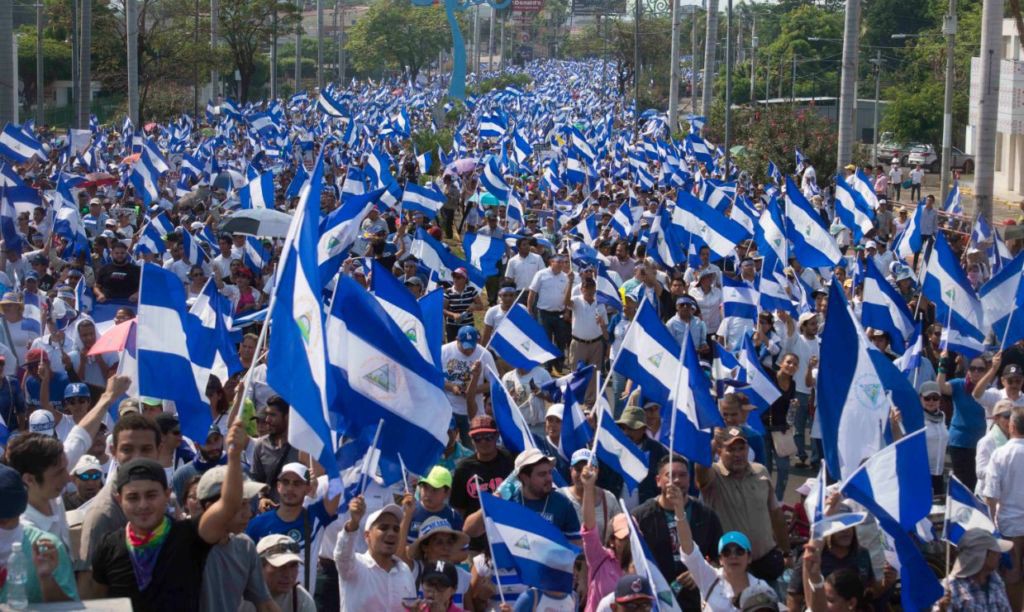Public Announcement: Ongoing Crisis in Nicaragua
Washington, DC, November 23, 2018 – The International Institute of Race, Equality, and Human Rights strongly condemns and rejects the resolution issued today, November 23, 2018, by the Nicaraguan Police […]

Washington, DC, November 23, 2018 – The International Institute of Race, Equality, and Human Rights strongly condemns and rejects the resolution issued today, November 23, 2018, by the Nicaraguan Police regarding the march convened to commemorate the International Day on the Elimination of Violence against Women by the Unidad Nacional Azul y Blanco [White and Blue National Unity] (UNAB), which had been announced was to be held on Sunday, November 25 in the city of Managua in protest over the violation of Nicaraguans’ fundamental rights for the last seven months by the Ortega-Murillo regime.
In the resolution, communicated by the Chief of the Directorate of Public Security of the National Police of Nicaragua, General Commissioner Luis Fernando Barrantes refuses to authorize it, while the National Police, in a clear abuse of power, classifies said initiative as a “vandalistic act” and “terrorist” with “coup aims” that envisages “affecting Nicaraguan families and the tranquility of the country.” In addition, it states in a threatening tone “. . . that the National Police does not authorize nor will authorize public mobilizations by persons, organizations, or movements that participated in and are being investigated for their actions in the failed attempt at a . . .”
As an institution that works in favor of the respect, guarantee, and protection of human rights, we repudiate said police communiqué, as it does not acknowledge, decontextualizes, and once again violates the right of Nicaraguans to protest peacefully to denounce the innumerable acts of harassment and repression committed by Nicaraguan authorities since April, in an attempt to foster a false sense of normalcy in the country when acts of harassment and intimidation in all public spaces continue being committed by the police, clearly endangering any possibility for regaining Nicaraguans’ tranquility, for whom this repression has given no respite.
Likewise, we denounce the indifference of the Nicaraguan State, which refuses to accept the existence of the victims of this humanitarian crisis from among the self-convened population, who today comprise more than 500 protestors, students, and activists who have been detained under conditions that endanger their lives, [physical] integrity, and due process, as well as the approximately 325 assassinations that continue to be shrouded in impunity and the acts of intimidation that are daily visited upon women, those who have been tried for the April incidents, journalists, human rights defenders, LGBTQI persons, and the community in general.
Race & Equality also vehemently condemns the acts of intimidation, assault, and harassment committed by the National Police in recent hours in different places in the city of Managua and other departments, which demonstrates that nothing is normal in Nicaragua. The arbitrary nature with which the police continue to act provokes an environment of fear and insecurity among the populace. We therefore demand the prompt release of the two Radio Darío collaborators, Omar López and Eduardo Patricio Amaya, who were kidnapped this morning. Amaya was granted protective measures by the IACHR, MC 693-18. We hold the State of Nicaragua responsible for any situation that violates [the] lives, [physical] integrity, and human rights of both Radio Darío employees.
We urgently call on the international community to take a stance in response to these acts that gravely violate the fundamental rights of the Nicaraguan people, who continue defenseless due to the dictatorial excesses committed by the current government. Likewise, we call on the international community to raise its voice against the abuses that are ongoing against Nicaraguans by a regime that continues to be reluctant to uphold its international human rights commitments.

